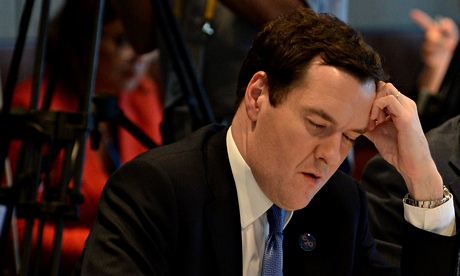
The chancellor, George Osborne, is just about on track to meet the Treasury’s official full-year borrowing forecast of £111.2bn, say economists. Photograph: Dan Himbrechts/AFP/Getty Images
The chancellor, George Osborne, will have no room for major tax or spending give-aways in next month's budget after figures showed a smaller than expected tax windfall in January.
The latest data from the Office for National Statistics showed that the UK is on course to meet its full-year borrowing targets but left the chancellor with minimal margin for error.
showed full-year borrowing is on course to just about meet the Treasury's official forecast.
A January surplus of £4.7bn was much lower than the £8.1bn forecast by economists and smaller than the £6bn recorded in the same month last year.
The start of the year is typically a bumper month for the public purse thanks to a glut of income tax and corporation tax payments, but last month showed the lowest January surplus in four years.
Government coffers were hit by lower receipts from income and wealth taxes despite a broader economic recovery and falling unemployment. Corporation tax receipts were also lower than last year, after a sharp fall in receipts from oil and gas companies due to a decline in North Sea production.
Economists described the last set of borrowing figures to be published before the budget on 19 March as disappointing. They said the chancellor now had a limited chance of significantly undershooting the Office for Budget Responsibility's forecast for £111.2bn of full-year borrowing, limiting his ability to woo the electorate by announcing big giveaways ahead of the 2015 general election.
John Hawksworth, chief economist at accounting group PwC, said: "This reinforces the message that there is still a long way to go to put the public finances back on a sound footing, and is likely to imply a relatively cautious approach by the chancellor in the budget.
"As he made clear in the autumn statement [in December], there are still many years of fiscal austerity to come and little room for pre-election giveaways."
Government borrowing totalled £90.7bn in the first 10 months of the 2013-14 fiscal year. Responding to the borrowing figures, Labour said George Osborne was set to break his promise to "balance the books" by 2015-16, made when the coalition came to power.
"This is the cost of the three damaging years of flatlining and falling living standards we have seen since the election," said Chris Leslie, the shadow chief secretary to the Treasury.
January is typically a bumper month for the public purse, as a result of income tax and corporation tax payments. Last month however the government coffers were hit by lower receipts compared with a year earlier, mainly from income and wealth taxes despite broader economic recovery and falling unemployment.
Corporation tax receipts were also lower than last year, after a sharp fall in receipts from oil and gas companies amid a decline in North Sea production.
A spokesman for the Treasury said: "The government's long-term economic plan is working. The deficit has fallen by a third. But as today's figures show, the job is not done and the biggest risk to the recovery would be abandoning the plan that is boosting economic security for Britain's hard-working people."
Andrew Goodwin, a senior economic adviser to economic forecasters the EY Item Club, said the weakness in income tax seemed to reflect very low receipts from self-assessment forms, with payments possibly delayed until February.
"Given that a sizeable chunk of the revenue comes in after the self-assessment deadline, it is quite possible that this weakness will reverse next month, but this does send us into the budget on a somewhat downbeat note," he said.
There was mixed news for the chancellor in further official data that showed January retail sales fell more than expected on the previous month but were still up on the same period a year ago.
Economists said consumer spending was still likely to deliver a sizeable boost to the economy in the first quarter, with the outlook for retail sales benefiting from rising employment and easing inflation.
The Office for National Statistics said retail sales fell 1.5% in January compared with December, the biggest drop since April 2012. A slowdown had been expected after a strong Christmas.
Retail sales were still up 4.3% on 2013 as analysts said the overall picture was relatively buoyant. "The underlying trend in the data suggests that a brightening mood among UK households is translating into higher consumer spending," said Chris Williamson from data specialists Markit.
No comments:
Post a Comment
thank you for your precious time and feedback.